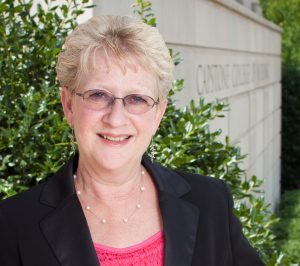By: Bryant Welbourne

Dr. Alice March’s summer has been very rewarding to say the least. As a result of two grant proposals to the Health Resources and Services Administration, UA’s Capstone College of Nursing will receive funding totaling more than $1 million to support graduate students through Scholarships for Disadvantaged Students and the Nurse Faculty Loan Program.
The Scholarships for Disadvantaged Students program works to increase the number of graduates practicing in primary care, enrollment and retention of full-time students from disadvantaged backgrounds and graduates working in medically underserved communities.
“The nursing workforce doesn’t match the diversity of our patients,” said March, who is a professor in the College. “When we look at diversity in our field, we not only take into account minority groups, but also men. As it currently stands, the rate of diversity in the profession related to minorities is about 17 percent, while men make up about 10 percent of the nursing population.”
According to the proposal, students from disadvantaged backgrounds are defined as belonging to ethnic or underrepresented groups (including men in nursing), students who have a demonstrated financial need (per federal poverty guidelines) and students whose social situations are consistent with one or more economic or social disadvantage variables. The goal is to prepare 70 primary care nursing graduate students with nurse practitioner and case manager options who will provide care to persons residing in medically underserved and rural communities.
The SDS grant is awarded in four-year cycles. The current cycle started in 2016, with the College being awarded $600,000 for the 2018-19 academic year. The College also participated in the program during the 2012-16 cycle. During that time, 94 nurse practitioner and doctor of nursing practice students received support.
While the nursing shortage across the nation has been well documented, the need for nursing faculty is far more important, according to March. This is because without educators, there will not be enough well-educated nurse graduates to care for the aging population. In a 2017 report by the American Association of Colleges of Nursing, more than 64,000 qualified nursing school applicants at the bachelor’s and master’s levels were denied admission to a nursing program due to the shortage of nurse educators.
The Nurse Faculty Loan Program aims to increase the nursing faculty workforce in Alabama and the U.S. by providing loans to manage the costs of tuition, books, fees and related expenses for students earning a Doctor of Education for nurse educators or a Doctor of Nursing Practice at UA.
“This will be the fifth year we’ll receive support from the NFLP and there is already interest in the program, some of which is from our alumni,” said March.
The NFLP grant total for this academic year is more than $580,000. To participate, students must commit to the program during the application process and are expected to obtain full-time faculty employment within 12 months of graduation. Upon gaining employment, program participants are then eligible for partial loan cancellation over a four-year period. Support from the NFLP will be made available for 56 EdD student and 15 incoming DNP students through the College.
